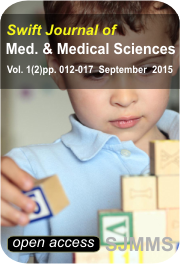Journal Categories

Swift Journal of Medicine and Medical Sciences (SJMMS)
August 2015 Vol. 1(2), pp. 012-017
Copyright © 2015 Swift Journals
Original Research Paper
Mycoplasma Fermentans and Deciliation as a Precursor to Regressive Autism.
Bill Welsh
Founder and Honorary President, Autism Treatment Trust, Edinburgh, Scotland, UK
*Corresponding Author E-mail: bwautismtrust@aol.com
Accepted 4 September, 2015
Abstract
Autism and related spectrum disorders (ASD), once rare, are now common. Today, over 100,000 school children in the UK has an autism/ASD diagnosis (1). It is forecast that this number will increase to 250,000 by the year 2023 (see graph). Recent research from Harvard University estimates the current annual cost of autism in the UK at £34 billion (and in the USA $126 billion) (2), it therefore follows from the forecast growth in numbers that future costs will escalate. Explanations for this unwanted phenomenon (the autism epidemic) advanced by medical science, e.g., oral antibiotics introduced in the early 80s; prenatal ultrasound; acetaminophen replacing aspirin: obstetric drugs, etc. have all been promoted as potential causes, but none appears to match the cascade of adverse physiological events witnessed by parents over time in the often gradual deterioration of their child. One possible cause, espoused by parents, is vaccination, in particular the MMR vaccine. Official focus has, however, remained on the need to maintain public confidence in MMR in order to prevent communicable diseases, rather than on a thorough investigation of parental testimony. Independent examination of veterinary vaccine history and of the cell-line technology involved reveals a growing concern regarding contamination by covert pathogenic bacteria, in particular Mycoplasma fermentans (3). The introduction of a triple live virus vaccine (MMR) will have increased the probability of cell line contamination. It has been suggested that potentially 50% or more of cell lines worldwide are contaminated (4). Mycoplasma has an affinity to the cilia, the microscopic, hairlike structures or organelles that extend from the surface of nearly all mammalian cells, cilia are vital to the function of the auditory system. For regressive autistic children the world can be a confusing, isolating and daunting place and it is their fundamental problems with communication and social interaction that are often the root cause of their difficult behaviours. The three main areas of difficulty which all people with autism share are sometimes known as the 'triad of impairments': difficulty with social communication, social interaction, and social imagination. Much of what is seen and described as autistic symptoms (communication problems, behavioural difficulties and sound sensitivity) is worth considering in the context of dysfunctional hearing. Auditory processing disorders are common in children with autism (5). The auditory canal, the brain, and the mucosa of the Gastrointestinal tract are favoured locations for mycoplasmas. Again, parents often point to these three areas as the ones most implicated in their child’s regression. It is proposed that the opportunistic bacterial pathogen Mycoplasma fermentans may be the underlying cause of regressive autism in children. Due to the intracellular nature of the pathogen this hypothesis may be best tested using the Memory Lymphocyte Immunostimulation Assay (MELISA). Existing research using forensic Polymerase chain reaction has already found that over 58% of patients with an Autistic Spectrum Disorder diagnosis showed evidence of Mycoplasma infection (6).
Keywords: Auditory. Autism. Cilia. Gastrointestinal. Mycoplasma Fermentans. Vaccination.
Read [Full Text - PDF]
